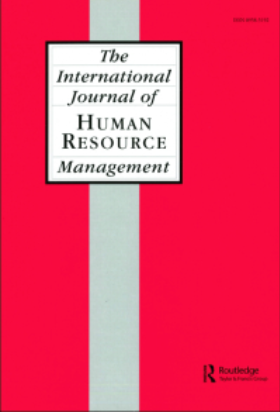预测员工承诺和满意度:社会化和人口统计学的相对影响
IF 5.9
2区 管理学
Q1 MANAGEMENT
International Journal of Human Resource Management
Pub Date : 1999-01-01
DOI:10.1080/095851999340125
引用次数: 79
摘要
本研究比较了组织社会化和人口统计变量对工作满意度和组织承诺的相对影响。通过调查193名香港中国员工对公司内部社会化的评价来评估组织变量,即:(1)接受的培训;(2)对组织的了解;(3)同事支持;(4)公司的未来前景。因变量是衡量(情感、持续和规范)承诺和满意度(同事、薪酬、晋升、主管和工作)的标准指标。结果显示社会化措施与工作满意度和工作承诺之间的相关性高于人口统计措施与因变量之间的相关性。虽然一些人口统计指标具有一定的预测能力,但回归分析证实,社会化变量始终是满意度和承诺的更强预测因素。对人类的战略影响……本文章由计算机程序翻译,如有差异,请以英文原文为准。
Predicting employee commitment and satisfaction: the relative effects of socialization and demographics
This study compared the relative influences of organizational socialization and demographic variables on job satisfaction and organizational commitment. Organizational variables were assessed by asking 193 Chinese employees in Hong Kong to evaluate socialization within their companies, namely: (1) training received; (2) understanding of the organization; (3) co-worker support; and (4) future prospects within their companies. Dependent variables were standard measures of (affective, continuance and normative) commitment and of satisfaction (with co-workers, pay, promotion, supervisors and the work). Results revealed higher correlations between the socialization measures and job satisfaction and commitment than between the demographic measures and the dependent variables. Although a few demographic measures had some predictive power, the regression analyses confirmed that the socialization variables were consistently stronger predictors of both satisfaction and commitment. Strategic implications for human r...
求助全文
通过发布文献求助,成功后即可免费获取论文全文。
去求助
来源期刊
CiteScore
11.70
自引率
7.10%
发文量
77
期刊介绍:
International Journal of Human Resource Management is the forum for HRM scholars and professionals worldwide. Concerned with the expanding role of strategic human resource management in a fast-changing global environment, the journal focuses on future trends in human resource management, drawing on empirical research in the areas of strategic management, international business, organizational behaviour, personnel management and industrial relations that arise from: -internationalization- technological change- market integration- new concepts of line management- increased competition- changing corporate climates Now publishing twenty-two issues per year, The International Journal of Human Resource Management encourages strategically focused articles on a wide range of issues including employee participation, human resource flow, reward systems and high commitment work systems. It is an essential publication in an exciting field, examining all management decisions that affect the relationship between an organization and its employees. Features include; -comparative contributions from both developed and developing countries- special issues based on conferences and current issues- international bibliographies- international data sets- reviews

 求助内容:
求助内容: 应助结果提醒方式:
应助结果提醒方式:


